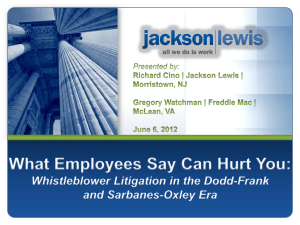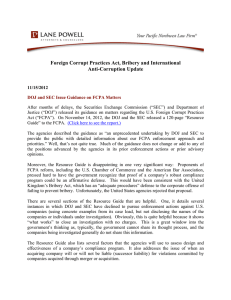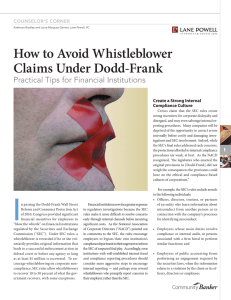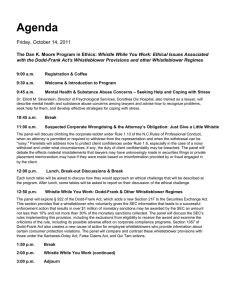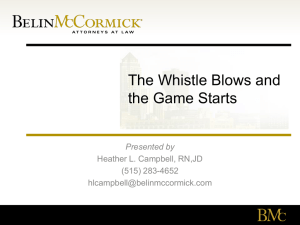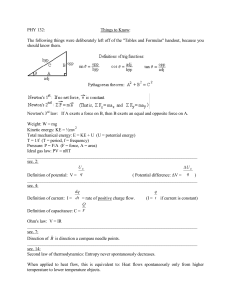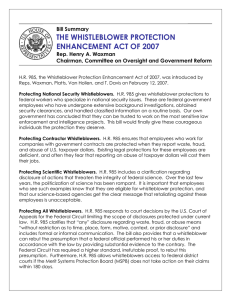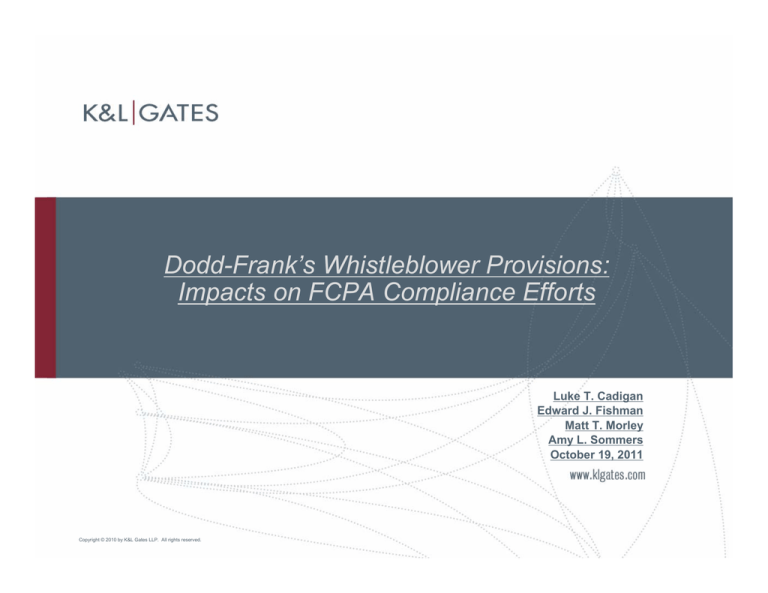
Dodd-Frank’s Whistleblower Provisions:
Impacts on FCPA Compliance Efforts
Luke T. Cadigan
Edward J. Fishman
Matt T. Morley
Amy L. Sommers
October 19, 2011
Copyright © 2010 by K&L Gates LLP. All rights reserved.
Dodd-Frank’s Whistleblower Provisions: in Brief
1
Dodd-Frank Section 922: Exchange Act Section 21F
SEC enforcement action with sanctions over $1 million
SEC must pay 10 to 30 percent of recovery
To any eligible whistleblower
Who has voluntarily provided the SEC with
Original information about a possible violation of the
federal securities laws
Applies to violations of the FCPA Exchange Act provisions
applicable to “issuers”
Anti-bribery
Books and records / internal controls
Does not apply to violations of parallel FCPA provisions
applicable to “domestic concerns”
2
Who can be an eligible whistleblower?
Almost anyone
Reports can be made anonymously
Wrongdoers are eligible for awards, unless they are
criminally convicted
But no amnesty for whistleblowers
Illegally obtained information can provide the basis for an
award, unless the whistleblower is convicted of a crime for
obtaining it
Lawyers and independent public accountants generally cannot
qualify for an awards by providing information in violation of
their professional obligations
3
Anti-retaliation provisions
Broad anti-retaliation protection for whistleblowers
Employer may not discharge, demote, threaten or
discriminate against whistleblower
SEC can bring enforcement action against the
employer for retaliation
Whistleblower also has federal right of action to
enforce this provision
4
Key issues for FCPA compliance efforts
5
Tension with Corporate Compliance Efforts
Dodd-Frank program may incentivize employees to
report to the SEC rather than internally
No requirement that employees report concerns
internally in the first instance – or ever
SEC rule seeks to “not discourage” employees from
first reporting to the company
SEC is required to consider higher percentage
awards for those who first report internally
SEC is required to consider lower awards for those
who interfere with internal reporting systems
6
Intensified pressure to make a rapid decision about
voluntary disclosure
Potential race to the SEC
Only the first person to report information to the SEC will be
eligible for a bounty
Companies may seek to report first to obtain cooperation credit
Internal review may provoke additional risk that a
whistleblower will approach the SEC
Company personnel who learn of a potential FCPA issue as a
result of being questioned in an internal review can qualify for
the bounty
Changes the calculus of the self-reporting decision
Greater chance that FCPA violations will come to SEC attention
Greater risk that whistleblower will report FCPA violations
before the company does
7
Pressure to complete internal reviews within 120 days
Compliance and internal audit personnel are precluded from
qualifying for an award by providing information that they learn
in connection with their responsibilities
Unless:
Company doesn’t self-report within 120 days, or
“Reasonable basis to believe” that:
Company is engaged in conduct that will impede
an investigation of the misconduct; or
Disclosure is necessary to prevent substantial
injury to company or shareholders
8
What effect is the whistleblower program
having on the SEC’s FCPA
investigations?
9
New or Improved Sources of FCPA Investigations
• Whistleblowers
• Revamped centralized tips, complaints, & referrals system
• Enhanced cooperation with international authorities
• Proactive approaches
• Risk-based focus on companies doing business in
countries and industries of significant concern
• Industry sweeps
• Scrutiny of tainted programs and corrupt actors
10
SEC Treatment of Whistleblower Complaints
• A blessing and a curse for the SEC
• SEC makes initial assessment as to whether claim has
substance
• Given past criticism, SEC takes all whistleblower claims
seriously
• Claims generally given disproportionate attention and
resources
• Claimant, often represented by counsel, has monetary interest
in success of investigation
• Claims present difficult matters to close
• Looking for cases to bring attention to the program
11
Interactions with the Company
• So long as it serves the SEC’s purposes, it will keep secret the
involvement of the whistleblower and the nature of the
allegations
• SEC need not tell company counsel that it is talking with
the whistleblower, even if a current employee
• Gives the government an opportunity to assess the extent of
the company’s cooperation
• Can be in the government’s best interests to keep the
company guessing
• The company will eventually get opportunity to respond to
allegations but what record will exist by then?
12
The Very Early Self-Report
• Internal investigations can prompt reports to the SEC
• If someone comes forward during the pendency of the
investigation, the company may not get the benefit of being
able to claim that it self-reported
• The government has been encouraging companies to make
early self-reports of potential FCPA violations where
appropriate
• Risk attendant to government scrutiny before company
has all the facts
• Once you self-report, you cannot do it half-way
• Reporting to the Regional FCPA Units in Boston, Los Angeles,
Miami, Salt Lake City, San Francisco and Fort Worth
13
Best Practices for Encouraging
Internal Reporting of FCPA Issues
14
What Has Not Changed
Dodd-Frank’s whistleblower provisions do not require
public companies or regulated entities to adopt any new
compliance program provisions.
Unlike other recent regulations, this rule does not
require companies to implement new policies and
procedures
At the same time, any company involved in activities
that might be subject to the federal securities laws
may want to assure that they have done all that they can
to encourage internal reporting of potential wrongdoing
15
The Goal – Get Ahead of the Issue
Proactive vs. reactive approaches
If a company is not the first to learn of potential FCPA
violations, the chances now seem very much
increased that the SEC will learn of the issues from a
whistleblower
This will have an impact on both FCPA internal
investigations and voluntary disclosure decisions
16
Encouraging internal reporting
Seek to maximize the possibility that the company will be
the first to know of potential wrongdoing
Consider a stand-alone internal reporting policy to send a
clear message to company personnel
Promote the expectation that the company wants to
know about potential wrongdoing
Appeal to shared values, like integrity
Remind personnel of the risks posed by illegal conduct
Explain the company’s need to know of employee
concerns
17
Encouraging internal reporting
Require internal reporting in corporate policies
Actively encourage reporting of genuine concerns
– even if they turn out to be mistaken.
Provide clear instructions on how to report
Offer alternative ways to report
Describe what the company will do with reports
As appropriate: prompt investigation by independent
personnel
Make clear that retaliation of any kind will not be
tolerated
Provide point of contact for persons who believe
they have been subjected to retaliation
18
Be prepared to respond to SEC Enforcement
SEC Enforcement Staff may contact companies in response to
whistleblower reports
Regardless of whether SEC identifies source of inquiry, assume
there is a whistleblower
Company has an opportunity to maximize its ability to influence
the situation by demonstrating cooperation, credibility, and
competence to staff
Staff expectations of cooperation are extremely high
Advance planning can position company to make an
appropriate response
Be prepared to undertake a prompt internal review
Consider establishing a protocol setting out how reviews will be
conducted
Identify circumstances in which Company may seek to have
independent counsel conduct the review
19
Be prepared to respond to internal reports
Act quickly on reports of potential wrongdoing
As appropriate, undertake an internal investigation of the
issue
Consider having an independent third party conduct the
investigation
What is the potential magnitude of the issue?
Might senior personnel be implicated?
Report findings up the chain
Consider ability to report back to the whistleblower regarding
the results of the investigation and any corrective action
taken
20
Reinforce the Message
Train rank and file and their supervisors to recognize and
address potential issues
Interview departing personnel
May be a last chance to get ahead of the issue
Consider local law issues
Convince personnel that company really wants to hear
these things
Particular challenges
Foreign jurisdictions
Integration of acquisitions
21
Enhance FCPA compliance systems
Make systems more proactive / less passive
Update periodically based on emerging risks and any
changes in business model or geographic scope of
operations
Conduct periodic FCPA risk assessments
Active monitoring of FCPA compliance by company and
third-party agents
Retrospective auditing of compliance (particularly
following M&A transactions)
22
Reduce the risk of retaliation claims
Limit the number of individuals aware of the identities
of whistleblowers
Do not seek to identify anonymous whistleblowers
Provide training for managers at all levels
Adhere to best practices for employee evaluations
Document fully and accurately
Review performance honestly and timely
Exercise extra caution with employees who may use
whistleblowing as an offensive strategy
23
Cross-border FCPA compliance issues
24
Cross-border compliance issues:
China as a case study
What are the practical implications of the fact that
privilege might not be recognized in all
jurisdictions?
Given US regulators’ strong preference for crossjurisdictional collaboration, approach SEC
whistleblower inquiries with the assumption that
SEC will attempt to approach counterparts in the
locality where alleged wrongdoing occurred
That’s the ‘bad news’ – in case of China, the ‘good
news’ is that antibribery enforcement is quite
diffuse (as compared with the US) and that means
it’s currently not likely that an SEC report to
Chinese authorities will in fact result in a PRCbased enforcement action
25
Non-US jurisdictions may have a more diffuse
enforcement landscape
China agencies with
potential jurisdiction
include:
• Administration of Industry &
Commerce (multiple levels)
• Procuratorate (could be in
multiple provinces)
• State-owned Assets
Supervision & Administration
Commission
• Chinese Communist Party
• Industry-specific agencies
(e.g., Ministry of Health)
26
Practical implications of the fact that privilege might
not be recognized in all jurisdictions? (cont.)
It’s more likely a local PRC enforcement action will start
independently and develop into a direction suggesting
the advisability of disclosure to the SEC
In responding to a local enforcement action, one must be
mindful of maintaining attorney-client privilege under US
law; whether that concept exists under local law must be
determined
China does not have a concept of attorney-client
privilege
27
Practical implications of lack of privilege (cont.)
The ‘good news’: currently Chinese enforcement actions
tend to focus on in-person interviews and ‘self confession’
(not disclosure) rather than forensic-type demands for
broad discovery
If a local enforcement action is handled properly from the
outset (a topic for its own discussion!), the absence of
privilege is not likely to compromise the PRC-based
investigation
Practice tip: in a local enforcement action, determine
early on whether privilege exists under local law and get
local guidance on how to respond so as not to increase
US risks
28
If you make a voluntary disclosure in one jurisdiction,
do you also do it in the other affected jurisdictions?
Again, making an initial assessment of pros/cons in that
specific jurisdiction is vital in assessing how to proceed
In China, you should assume that if your case is
disclosed in US media, it will come to attention of PRC
regulators through Chinese language media (and
sometimes, the Chinese media may even report first!
e.g., IBM case).
29
Voluntary disclosure (cont.)
Voluntary disclosure not recognized practice in
China…but new Art. 164 of the PRC Criminal Code
(‘China’s FCPA’) does allow for reduced/ waived
penalties where violator self-discloses
Probably fair to say that in China, most officials would
find self-disclosure potentially awkward
Cases may implicate employees of state-owned
enterprises - may not want to investigate them
Superior agencies may question whether the officials’ lack
of supervision/oversight led to the problem
Decision whether to disclose should be informed by
locally knowledgeable advisors
30
Employees outside the U.S. who refuse to cooperate
with an investigation?
In China, there are only limited grounds for
termination/discipline
Means your company must have its ‘ducks in order’
when forming an employment relationship or you won’t
be able to take effective action later when internal
investigation/enforcement action arises
Employment agreement, internal work rules and code of
conduct must address access for investigations (mobile
phone, computer), obligation to cooperate, whether labor
arbitrations can be attended by outsiders
31
Questions?
32

